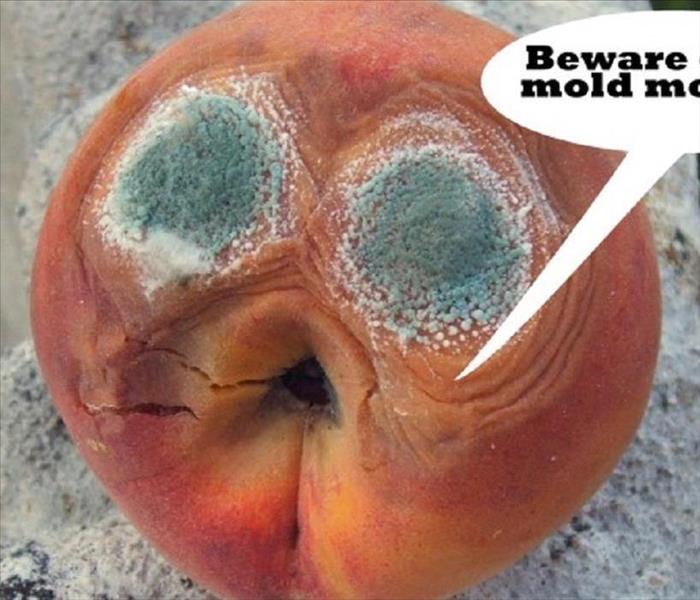8 Bad "Facts" ABout Mold Everyone Thinks Are True
11/16/2017 (Permalink)
8 Bad “Facts” About Mold That Everyone Thinks Are True
With all the misinformation about mold out there it is easy to over react. Here are four “facts” that are over reactions to mold.
Bad “Fact” 1: All Mold Is Bad
Nope! Have you ever eaten blue cheese or take penicillin? Mold is used in the making this kind of cheese and medicine.
Bad “Fact” 2: All Mold Causes Health Problems
In reality, the effect of mold on people varies greatly. Molds produce allergens, and while some people will be allergic to the allergens produced by mold not everyone will react to mold, and the effects can be varied depending on ones’ sensitivity to mold
People who are highly sensitive to mold may develop allergic reactions and show symptoms such as difficulty breathing, bloody noses, itchy and watery eyes, etc. People with already compromised immune symptoms are also at risk for reacting to mold, and some studies have suggested that serious health effects can arise from repeated exposure to mold, so it is not something to play around with.
Bad “Fact” 3: There Should be No Mold Inside
In reality mold is all around us and is very natural. There are mold spores in the air you are breathing and there is really no way around this unless you decide to live inside a plastic, environmentally controlled bubble. The problem is not that there is mold indoors the problem is with the concentration of mold indoors. Mold should not be growing in your walls or on surfaces as that can be a problem and contribute to allergic reactions.
We will always live with mold, the question is how much mold should we live with? The answer to that is still being worked out. As mold affects people differently you should talk to your doctor if you think you are suffering from exposure to mold and you take steps to reduce your exposure to mold..
Bad “Fact” 4: Bleach Kills Mold
This is kind of a half truth. Bleach may kill certain kinds of mold on non-porous surfaces, however, it is not clear that bleach can kill all kinds of mold nor kill mold on porous surfaces such as wood. Research is continuing to be done on the effectiveness of bleach as a mold cleanup agent. It should be noted that using bleach to “kill” mold poses its own health risks and is not a recommended solution by EPA or OSHA. Bleach is also very corrosive and can cause further damage if not used correctly.
Bad “Fact” 5: Killing Mold is Enough, I Don’t Need to Remove it
Killing mold is not enough. Putting aside the conflicting reports on what kills mold, simply killing mold does not remove the health effects as the allergens are still present even in dead mold. To properly protect against health effects, removal of the affected areas is often necessary. Care must be taken when removing the affected areas so that the allergens and mold is not spread throughout the house. That is why professional mold remediation services are often necessary to properly fix a mold problem.
Bad “Fact” 6: Mold is Natural, You Shouldn’t Worry About it
While mold may be natural, consistent exposure to mold can have negative affects on ones health. If mold is growing in your home or place of business it needs to be addressed as it will deteriorate your building and can cause health problems.
Bad “Fact” 7: If You Only See a Little Mold it is Probably Nothing to Worry About
If mold is to the point where it is visibly growing on surfaces in your home you have a problem. Mold is like an iceberg, you generally only see the tip of it while the majority is below the surface. If you see a little bit of mold you most likely have more growing under the surface out of site.
Bad “Fact” 8: Cleaning up Mold isn’t Hard. You Should Do it Yourself
This is another half truth. While you may be able to clean up certain kinds of mold in small quantities most people are not equipped to do proper mold remediation. Simply wiping down the evidence is not good enough. To properly “cleanup” a mold problem you must identify the cause, isolate the area to keep the mold from spreading, and clean and or remove the affected surfaces. Unless you know how to setup a containment unit, have a couple of commercial sized HEPA air filtration units, protective gear, HEPA vacuums, specialized cleaning agents, and can do a wet extraction to keep mold spores from spreading. Call SERVPRO of Virginia Beach if you think you may have any mold. 757-431-1400.





 24/7 Emergency Service
24/7 Emergency Service
